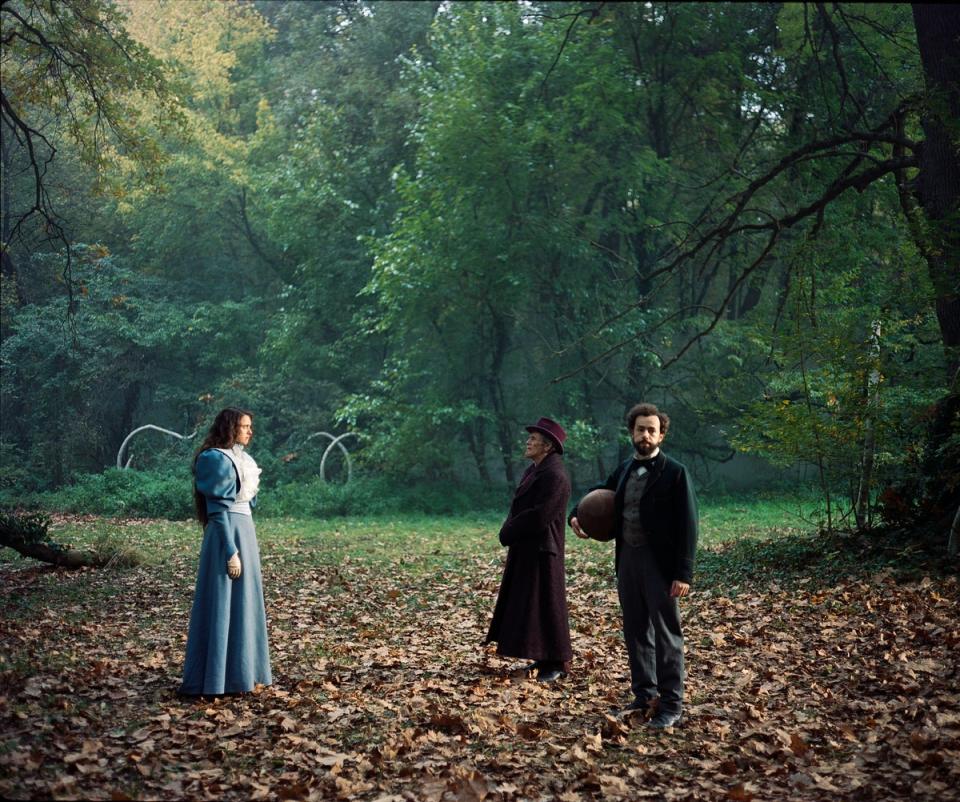Poor Things movie review: Yorgos Lanthimos and Emma Stone have triumphed again
Nearly six years after the runaway success of The Favourite, Lanthimos returns with Poor Things, an incredible story that bears more than a hint of Frankenstein or Coppelia but with touches of Tim Burton to boot.
The Greek director originally made his name as a maker of weird comedies that were perhaps too dark to garner much love beyond the festival circuit. The Favourite changed all that, and Poor Things will only further cement Lanthimos’s popularity.
Based on Alisdair Grey’s 1992 novel of the same name, the film takes place at an unspecified date, but probably the end of the 1800s. A woman (Emma Stone), dressed in royal blue silk, throws herself from Tower Bridge. The following scenes are in black and white: we are introduced to Bella Baxter (Stone) and her adoptive father Godwin Baxter (Willem Dafoe). Reanimated by Baxter with the brain of a baby, she’s a childlike figure, playing the piano with her hands and feet, spitting out food she dislikes, stumbling through the house like a toddler. He’s an eminent surgeon with terrible scars crisscrossing his face and to Bella he is God (short for Godwin, but you get the picture).
When teaching a class, Baxter picks out Max McCandles (Ramy Youssef) from the audience of his anatomy theatre; he is looking for an assistant to monitor Bella’s progress. When he first encounters Bella, McCandles exclaims: ‘What a very pretty retard!’ Yet this child-woman is no simpleton; she is merely a blank canvas whose mind is as fresh and new as an infant’s.
Baxter sees danger at every turn. His own disfigurement makes him wary of social encounters and he tries to instill a fear of the outside world into Bella, but she is having none of it. When her sexual awakening occurs, her desire for freedom is as strong as her libido. It is decided that McCandles will marry her but only under the strictest conditions. When the ne’er-do-well lawyer Duncan Wedderburn (Mark Ruffalo) shows up with the pre-nup, this lothario seeks out the woman who has inspired such a contract, and a relationship inevitably ensues.

Thus the two embark on an adventure that takes them to Lisbon, Athens, Alexandria and Paris, the film reverting back to glorious colour. But as the ingenue travels, so her intellectual, emotional and ideological journey unfolds. There are plenty of adventures and twists and turns before the denouement back in London.
Ruffalo, sporting a rakish tache and a wobbly English accent, provides the most fun as the caddish toff. His performance has something of the archetypal baddie from a silent-era movie and he is a joy to watch. Dafoe, his handsome wrinkled visage etched with deep scars, reveals the deeper scars of his character’s terrible childhood. Dafoe is so reliably good at showing the humanity of his character (as well as being extremely funny with some of the best lines in the film), and Youssef is a lovely love interest, bringing warmth and compassion.
A big shout-out to Vicki Pepperdine as Mrs Prim, Baxter’s faithful housekeeper-cum-lab assistant, while Emma Stone is phenomenal as Bella, running the gamut of ages from her clumsy infantile beginnings to articulate maturity as her character negotiates learning all her life skills in the span of a few years (and 141 minutes). She carries this role with aplomb.
Tony McNamara, who did such tremendous work on The Favourite, has done a brilliant job of adapting Grey’s story. This surrealist fantasy tale shows a new, lighter side to Lanthimos, and he is aided in his rendering of this story by Shona Heath’s incredible production design. She has created a world that is both recognisable but completely fantastical. The film is set in the past but – like its protagonists – has its eye on the future. Costume designer Holly Waddington continues this theme, with Bella in particular given costumes that show she is not just an oddity but is far ahead of her time.
Dealing with issues of patriarchy, ownership and feminism, as well as philosophical debates about human nature, not to mention the thorny issue of prostitution and sexual freedom ("We are the means of our own production!"), this is a fascinating and entertaining ride. Together, Lanthimos and his team of players and crew have conjured up a delight that – like its protagonist – is eccentric, smart, a little dark, lovely to look at and charming as hell.
In cinemas January 12

 Yahoo Movies
Yahoo Movies 
